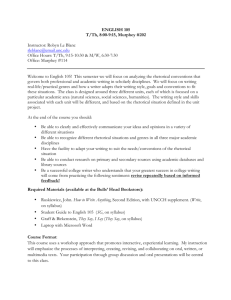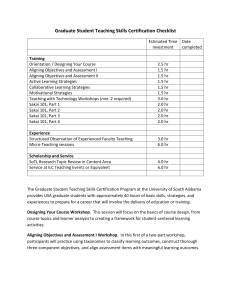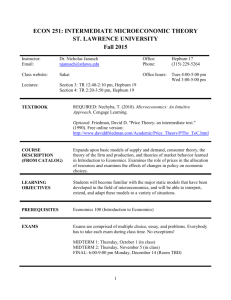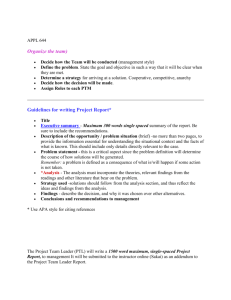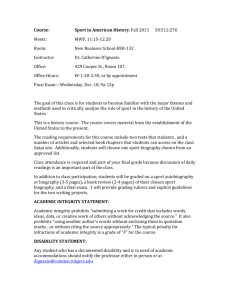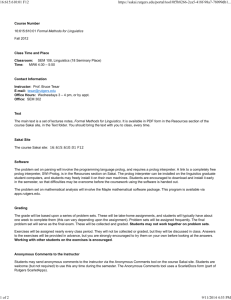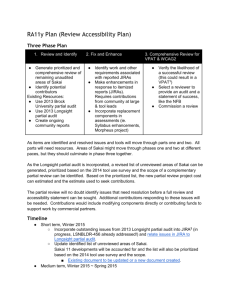English 105 Spring 2014 - Robyn Le Blanc
advertisement
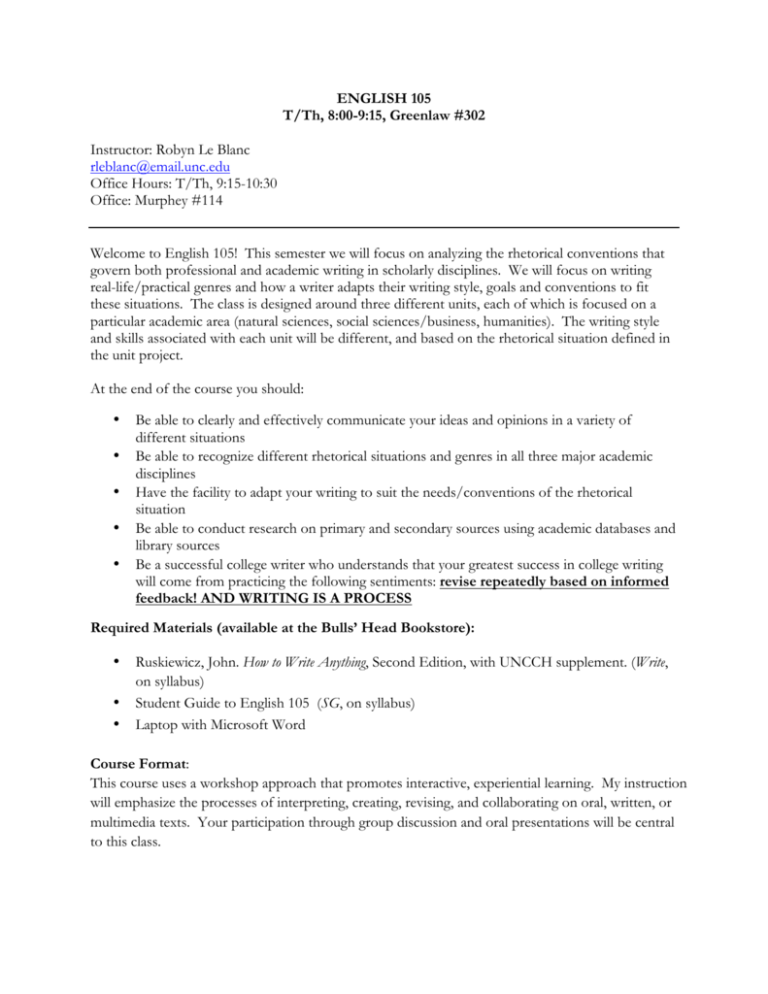
ENGLISH 105 T/Th, 8:00-9:15, Greenlaw #302 Instructor: Robyn Le Blanc rleblanc@email.unc.edu Office Hours: T/Th, 9:15-10:30 Office: Murphey #114 Welcome to English 105! This semester we will focus on analyzing the rhetorical conventions that govern both professional and academic writing in scholarly disciplines. We will focus on writing real-life/practical genres and how a writer adapts their writing style, goals and conventions to fit these situations. The class is designed around three different units, each of which is focused on a particular academic area (natural sciences, social sciences/business, humanities). The writing style and skills associated with each unit will be different, and based on the rhetorical situation defined in the unit project. At the end of the course you should: • • • • • Be able to clearly and effectively communicate your ideas and opinions in a variety of different situations Be able to recognize different rhetorical situations and genres in all three major academic disciplines Have the facility to adapt your writing to suit the needs/conventions of the rhetorical situation Be able to conduct research on primary and secondary sources using academic databases and library sources Be a successful college writer who understands that your greatest success in college writing will come from practicing the following sentiments: revise repeatedly based on informed feedback! AND WRITING IS A PROCESS Required Materials (available at the Bulls’ Head Bookstore): • • • Ruskiewicz, John. How to Write Anything, Second Edition, with UNCCH supplement. (Write, on syllabus) Student Guide to English 105 (SG, on syllabus) Laptop with Microsoft Word Course Format: This course uses a workshop approach that promotes interactive, experiential learning. My instruction will emphasize the processes of interpreting, creating, revising, and collaborating on oral, written, or multimedia texts. Your participation through group discussion and oral presentations will be central to this class. At the beginning of the semester, I will divide you into small groups, in which you will stay throughout the semester. Your group will serve as a writing group, as a discussion group, and as a smaller cohort within the larger community Assignments: Three major unit projects will be supported by a sequence of two smaller assignments called feeders. Using a process approach, you will write multiple drafts, receive ongoing feedback from peers and teacher, and participate in evaluating your own and others' projects. Additionally, you will have a number of in-class and homework assignments. All assignments are due on Sakai before the beginning of class unless otherwise notified. Late feeders and unit projects will lose one letter grade for each day late. Late homework (other than feeders and unit projects) will not be accepted unless the student provides documentation of a medical or personal emergency. Grading: The grading breakdown is as follows: Unit Assignments Feeders Participation Homework Syllabus Quiz 48% 20% 20% 10% 2% 10 points each 3 points each 10 points total 3 points each 10 points UNIT PROJECTS: I will grade your unit project assignments using a traditional 100-point scale. FEEDERS & HOMEWORK: Your homework assignments & feeders will be graded with checks. Check + Check Check – 0 =A (3 pts) =B (2 pts) =C (1 pt) =F (0 pts) Feeders will be graded according to a rubric; homework will be graded according to the completeness and quality of the assignment. PARTICIPATION: I will grade your participation based on a contract in which each student who meets the basic participation requirements outlined below will receive a B (8.5 pts). If you exceed requirements, you may receive an A (9.5 pts). Your classmates and I are relying on you to contribute meaningfully and positively to discussions and activities. In order to fulfill your grading contract, you must meet the following requirements: 1) 2) 3) 4) 5) 6) Volunteer meaningful contributions to class at least once a day. Come to class prepared with all of your materials. Demonstrate serious engagement in all peer review activities. Demonstrate effort in your homework assignments. Avoid disrupting the class. This includes disruptions caused by cell phones. Stay off any website not directly relevant to class discussion. This includes email and any social networking site. I will calculate your final grade (and unit project grades) according to the following scale: A AB+ B B- 95-100% 90-94% 87-89% 83-86% 80-82% C+ C CD F 77-79% 73-76% 70-72% 60-69% 0-60% It is my policy to “round up” for grades of .5 and above. I will only take into account the first number after the decimal. Attendance: We will do a significant amount of work in class, so your attendance is crucial to your success. You are allowed one unexcused absences. Each unexcused absence will negatively affect your participation grade (1/2 grade per absence). Each unexcused tardy counts as half of an unexcused absence. A tardy is defined as being late to class; there is no grace period. You may miss class without penalty in order to observe religious holidays; however, you must inform me of your intentions during the first week of class. If you are absent from class, it is your responsibility to make up in-class work you miss by the next class session. You must turn in any homework or papers that may be due electronically no later than the start of class on the day you are absent. After that, your assignments will be considered late. Also, you must follow this protocol when you will miss a class: 1) Email me that you will miss class. I need to receive this email by 9:00 am that day. 2) In this email, you need to tell me which student you have asked to take notes for you while you are gone and confirm that you are aware of and will make up the work. If there is homework due that day, be sure to it is turned in. 3) When you return to class, provide the documentation about your illness or emergency. As indicated in the UNC Student Guide, excessive absences are grounds for failure of this course. Conferences: Each student will be required to sign up for one individual writing conference during the semester. Conferences will be approximately 15 minutes long and will include a personalized discussion of a unit assignment on which you are currently working (see schedule for more details). You are also strongly encouraged to come and see me any time during my office hours, or by appointment. Sakai: We will be using the Sakai online course site frequently throughout the semester. I will post the syllabus, assignments, and important announcements/reminders to our course page. You are responsible for checking Sakai daily. Getting In Touch: Come by my office hours or schedule an appointment if you want to discuss your work in the course, or any questions/issues you have with assignments. I’m always happy to talk to you, so don’t be hesitant about stopping by ESPECIALLY if you are struggling with an assignment. I’m a pretty decent and understanding person, so just come talk to me if you’re having issues with anything in the course. I am also happy to read drafts of projects and feeders if you follow these guidelines: send me an email and schedule an appointment to come in (during office hours or at another time); send me a copy of the assignment (what you’ve got so far) the night before so I can read it; come to the meeting with specific questions or areas that you’d like to discuss. You can also email me any questions—this is usually quicker and easier for questions regarding citations and clarification. I’m on my email constantly, so I should get back to you pretty quickly. If I don’t, for whatever reason, hang tight—I’m either unavailable for whatever reason and will get back to you ASAP, or I’m trying to figure out the answer! One caveat: I make a habit of not checking my email between 9pm-8am. Please do not except a prompt reply during those times. A second caveat: If you’re confused about citations or something logistical like this, please try to find the answer yourself before emailing me. Citation generators or the library website are good resources, and you can find additional material in your How to Write Anything book. Honor Code: Every single person at the University is bound by UNC’S Honor Code. Please familiarize yourself with the Honor Code, and conduct yourself accordingly. Academic dishonesty, including cheating, plagiarism, and inappropriate academic collaboration, is inexcusable; therefore, the research that you do this semester, whether primary or secondary, print or online, formal or informal, will require careful documentation on your part. If I suspect you of plagiarizing all or part of a paper, even unintentionally, I am required to report the offense to the Honor Court, so, if you are running into trouble with a paper, PLEASE come and speak with me. It is much, much better to take a late penalty on an assignment than to risk Honor Court proceedings. The library website also contains the following helpful links: http://www.lib.unc.edu/instruct/plagiarism/, http://www.lib.unc.edu/instruct/citations/. Non-Discrimination Policy: This university does not discriminate against its students or employees based on race, color, national origin, religion, sex, age, or disability. The University’s policy states that sexual orientation be treated in this same manner. In this class we will strive to maintain an open atmosphere with shared respect for all differences. Students with Disabilities: The University of North Carolina at Chapel Hill ensures that no qualified person shall by reason of a disability be denied access to, participation in, or the benefits of, any program or activity operated by the University. In compliance with UNC policy and federal law, qualified students with disabilities are eligible to receive “reasonable accommodations to ensure equal access to education opportunities, programs, and activities” (http://www.unc.edu/depts/lds/faculty-policies.html). If you anticipate such accommodations, please notify me as soon as possible so that appropriate arrangements can be made. Additionally, you may seek out student support services at the Department of Disability Services (DDS) (http://disabilityservices.unc.edu/) and through the Learning Center (http://learningcenter.unc.edu/) Writing Center: The UNC Writing Center offers free tutoring services for students. You may visit the Writing Center to ask for help with a specific paper, whether you are concerned with developing ideas and content, organizing your assignment, or working on style issues. To make an appointment, browse the Writing Center's online resources, or send a draft online, please go to (http://www.unc.edu/depts/wcweb/). To make best use of your time there, bring a copy of your assignment sheet and your draft with you. The Writing Center will not proofread papers or talk with you about grades. Final Thoughts: This course will be challenging, but the benefits will also be well worth your efforts. Be prepared to work hard, but also make sure to have fun at the same time. I look forward to getting to know each of you throughout the semester, and remember that I am always happy to meet with you during office hours to discuss any relevant academic concerns. *I reserve the right to alter the drafted schedule of assignments in accordance with class needs and interests. You will be expected to keep track of any changes in schedule. SCHEDULE DATE COMPOSITION TOPIC Thurs Jan 9 Introduction & Writing Diagnostic Tues Jan 14 Writing in the Natural Sciences & Genres; Unit 1 Roadmap Thurs Jan 16 Library Day; Feeder 1.1 Discussion Tues Jan 21 Using Sources (citing, plagiarism, reliability); citation exercises Thurs Jan 23 Intro to Workshops; Feeder 1.1 Workshop Tues Jan 28 Outlining & Organization; So What? UNIT READING & HOMEWORK COMPONENTS DUE Writing 1) Look over syllabus Diagnostic 2) SG pp. 1-33 3) Write pp.390-392 1) Write UNC Supplement (end of Write) pp. 2-6, 910 2) Watch 3 sample TED talks (www.ted.com); explore the website and watch a few on different topics. Think about the TED talk as a “genre.” 3) Take “Syllabus and Student Guide” quiz on Sakai (15min time limit); take before 7am 1) Write pp. 356-361; 466-477; 296-300 (Annotated Bibliographies) 2) Unit 1 Topic Brainstorming worksheet (Sakai)— turn in copy in class and post a copy on the Unit 1 forum 3) Go to library.unc.edu and take a look around. Figure out where electronic resources are, and how to search for books (if you haven’t had any experience with this already) Topic Selection 1) Finalize topic and bring in two sources to Paragraph class—one MUST BE a book retrieved from the library 2) Post topic selection paragraph to Sakai Unit 1 forum by 7am (do not print a copy) 3) Write pp. 482-496 4) They Say Ch.2 (Sakai, under “Homework”) and do questions #1-2 on pp.40-41. Post your answers to the Sakai Unit 1 forum by 7am. 5) Bring SG to class Feeder 1.1 RD 1) Write pp. 482-486; 450-463 2) Post RD of Feeder 1.1 to Sakai forum by 7am 3) Finish citation exercises for Unit 1 if not completed in class 1/21; bring SG to class Feeder 1.1 1) Write pp. 398-427 (focus on “Organization”, “Outlines”, “Introductions” and “Conclusions”) 2) Read They Say, I Say Ch. 3 & Ch. 7 (Sakai) and then complete the “So What?” homework assignment on Sakai. Print a copy of your homework to turn in during class. 3) Print a hard copy of Feeder 1.1 to turn in at the beginning of class Thurs Jan 30 Feeder 2.1 Workshop; Powerpoint & Prezi Tues Feb 4 Unit 1 RD Workshop; Planning Ahead in Unit 1; Unit 1 Rubric & Peer Feedback Component Unit 1 RD Workshop #2 Thurs Feb 6 Tues Feb 11 Thurs Feb 13 Tues Feb 18 Unit 1 Presentations— Group A Unit 1 Presentations— Group B; Introduction to Unit 2 Genre Conventions & Writing in Business and the Social Sciences Thurs Feb 20 Idea Generation and Brainstorming Tues Feb 25 Doing “Field Research”: an introduction; Unit 2 project rubric Feeder 2.1 Workshop; Introduction to Branding & Advertisements as Rhetoric; Mapping Unit 2 Thurs Feb 27 Feeder 1.2 RD 1) Write pp. 577-599; 346-353 2) List of 3 things you want peer reviewers to focus on for workshop feedback (post in text-box with your Feeder 1.2 on Sakai) 3) Post RD of Feeder 1.2 to Sakai forum by 7am Feeder 1.2; Unit 1 1) They Say, I Say Ch. 13 (“Writing in the Sciences” Project RD #1 (Sakai)—be prepared to discuss this in-class 2) Unit project rough draft—should include at least 2 minutes of talk, outline of powerpoint slides; post to Sakai forum by 7am 3) Turn in hard copy of Feeder 1.2 at beginning of class Unit 1 Project 1) Unit project RD #2—should be entire 4 minute RD #2 talk, with powerpoint. Post to Sakai by 7am. 2) Unit 1 reflection paragraph: what one thing about Unit 1 do you feel the best about? What do you wish you could have changed? Why? Write a one-paragraph response to this and print it out and turn it in at the beginning of class. Unit 1 Project 1) Turn in hard copy of Unit 1 TED talk at the beginning of class. Unit 2 Brainstorming Worksheet 1) SG Social Sciences citation exercise, pp. 51 (complete and bring to class) 2) List of 4 skills you acquired in Unit 1 that you want to continue to improve upon in Unit 2 (post to Sakai forum by 7am). 1) Look over the sample business proposal on Sakai. 2) Read “Writing Your Own Proposal” pdf (Sakai)—be prepared to discuss this in class (do not complete “Writing Suggestions” exercise at end) 1) Unit 2 topic brainstorming worksheet (Sakai); post to Sakai AND bring a copy to class 1) Come up with a list of 5 other businesses similar to yours in goals and service; post these to the Sakai forum by 7am Feeder 2.1 RD 1) Post a draft of your Feeder 2.1 to the Sakai forum by 7am 2) Go to “Visual Rhetoric and Strategies of Persuasion” via Stanford (link on Sakai); read the intro there (main page, then make sure to click through to Example 2, Example 3 and Example 4). Make sure you read these pages thoroughly enough to contribute to a class discussion! Tues March 4 Image as Rhetoric Feeder 2.1 Thurs March 6 Feeder 2.2 Workshop; Work Session Feeder 2.2 RD MARCH 7-14 NO CLASS— SPRING BREAK Writing a Mission Statement; or “So What?” SPRING BREAK Unit 2 RD Workshop CONFERENCES Unit 2 RD #1 Thurs March 27 Introduction to Unit 3; how this all fits together Unit 2 Project Tues April 1 Writing in the Humanities, and Genre Conventions Topic selection Tues March 18 Thurs March 20 Tues March 25 Feeder 2.2 CONFERENCES 1) “Branding” worksheet (Sakai); post to the Sakai website and bring a paper copy to turn in in class 2) Print out a copy of the “Branding Rhetoric InClass” assignment and bring to class 1) Your rough draft should include: a business name, some ideas for a logo, a rough draft of your ad and a good sense of your intended audience. Post to Sakai by 7am. SPRING BREAK 1) Make sure to turn in a hard copy of Feeder 2.2 at the beginning of class 2) Find the mission statements of two companies online; post these to the Sakai forum by 7am 1) Unit 2 RD should include 3 pages of text. Post to Sakai forum by 7am. 1) Schedule and conduct a 15-minute conference with instructor between 3/18-3/26 2) Upload your second Unit 2 project rough draft to Dropbox by Saturday, March 23 at 7pm and complete the second Unit 2 RD workshop ONLINE by Monday, March 25 at 7pm. See instructions on Sakai in Unit 2 folder. 1) Read background info on Old Chapel Hill cemetery (link posted in Unit 3 homework folder on Sakai) 2) We’ll be going to the Old Chapel Hill Cemetery for the second half of class—plan accordingly (i.e. for the weather) 3) Print and bring a copy of the “OCHC Activity” worksheet with you!! 1) Homework: “what is the difference between the humanities and the natural and social sciences? What are humanities disciplines concerned with—what are their goals? How does this differ from the sciences? How do people in the humanities collect information to publish or study, and how is this different from the sciences? How might these goals and methodologies impact the types of writing you find in the humanities, and the conventions of writing for the humanities? “ Write a paragraph journal entry responding to this prompt and 2) 3) Thurs April 3 Cemetery Visit 1) 2) Tues April 8 Thurs April 10 Tues April 15 Thurs April 17 Tues April 22 Thurs April 24 1) post to the Sakai forum by 7am before class. Look at the sample art historical analysis in the Unit 3 folder on Sakai. Be able to describe what the “goal” of the essay is. Post your final topic decision on the Sakai forum by 7am. We’ll spend most of the class period at the cemetery; dress and pack accordingly! Print a hard copy of the “Feeder 3.1 Data Chart” from the Unit 3 folder on Sakai Bring in a list of three sources for your project (no need to post to Sakai) Post a copy of your Feeder 3.1 to Sakai by 7am; must include completed chart for 4 of your examples Print and bring a hard copy of Feeder 3.1 to turn in at the beginning of class. Doing Library Research: smarter, not harder! Feeder 3.1 RD Mini-Conferences & Work Session; Writing Descriptions Feeder 3.2 Workshop Feeder 3.1 1) Feeder 3.2 RD 1) Feeder 3.2 RD; post to Sakai forum by 7am 2) Bring in a “thesis” statement or “argument” paragraph. Putting it all together; refining your argument Unit 3 RD Workshop Unit 3 Projects Due/Last Day of Class Feeder 3.2 1) Print and bring a hard copy of Feeder 3.2 to turn in at the beginning of class. Unit 3 RD 1) Unit 3 RD should be at least 2 pages long; post to Sakai forum by 7am 1) Bring laptops for evaluations & reflection 2) Unit 3 Project

